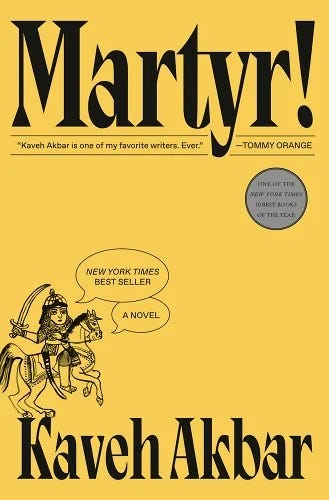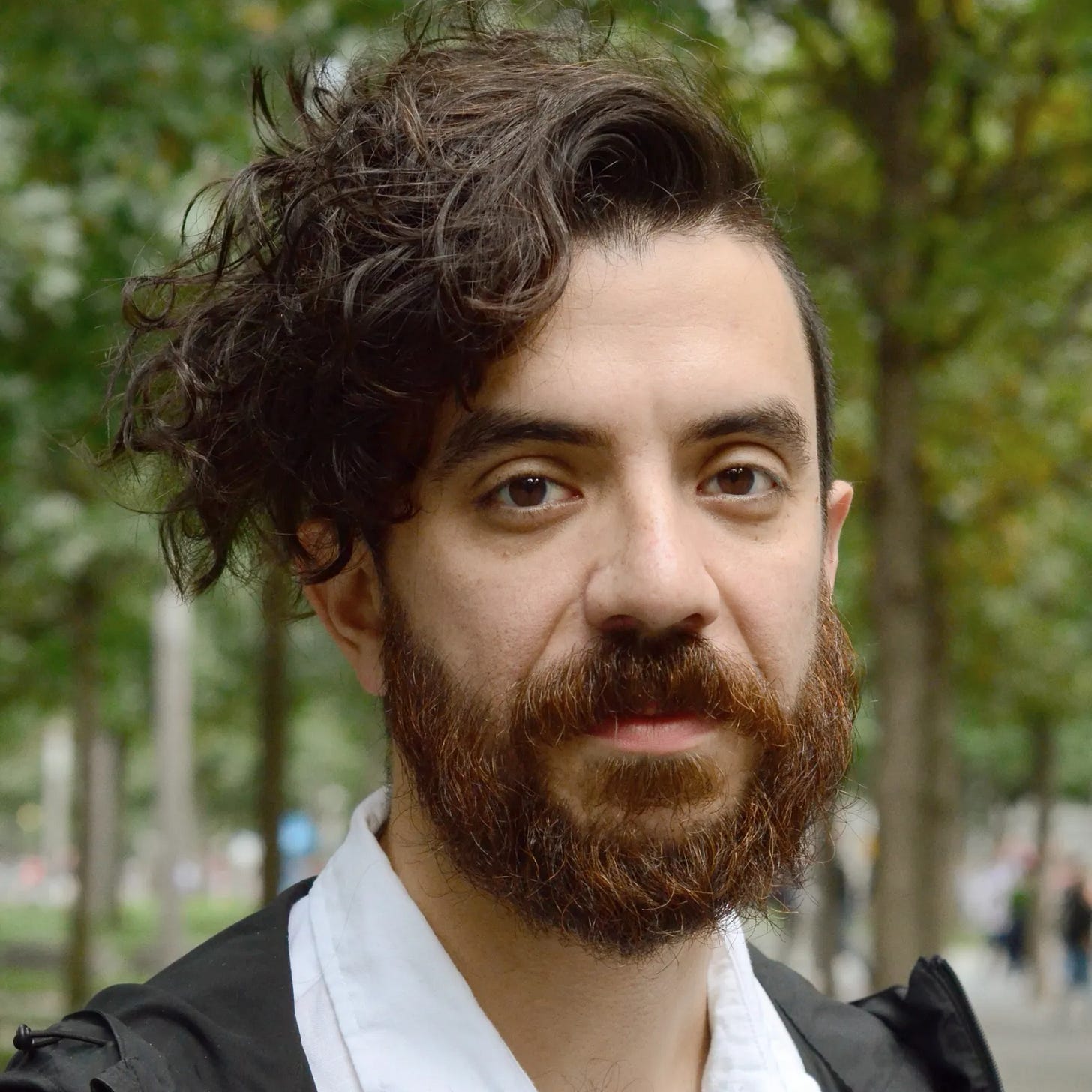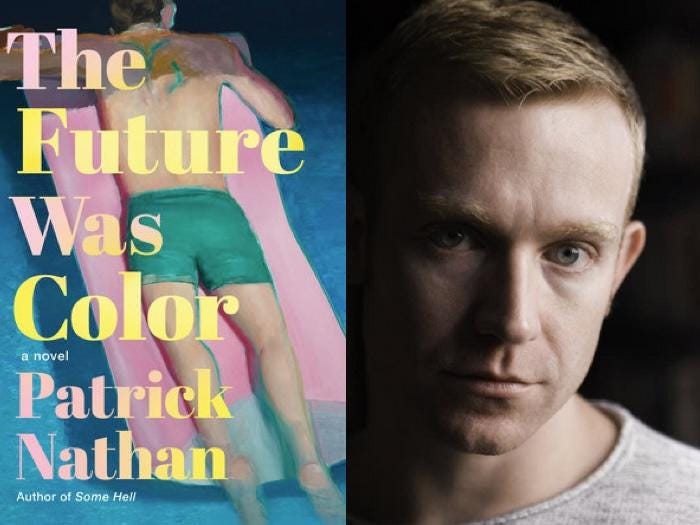Week 2: Is 2025 the year of good books?
I finally read two books that had been sitting in my to-read pile: "Martyr!" by Kaveh Akbar and "The Future Was Color" by Patrick Nathan.
Kaveh Akbar's debut novel, Martyr!, follows Cyrus, a struggling Iranian-American writer in his late twenties grappling with mental health issues stemming from a traumatic childhood and the loss of his mother (who was a fictional passenger on the very real, very tragic Iranian Air Flight 655).
This book lingered in my to-be-read pile until my book club selected it for this month. Though we couldn't meet due to the situation in Los Angeles (this is a friendly reminder to donate), I'm grateful to have this outlet to share my thoughts. While I'm late to the conversation, the time has allowed me to consider various critiques and form my own opinion amid the mix of praise and criticism. It is worth noting the book did end up on 21 of the 33 “Best of 2024” Lists.
The novel explores themes of grief, addiction, and identity, weaving together Cyrus's present-day struggles with flashbacks to his family's past in Iran and his experiences as a bisexual Iranian in the American Midwest. Cyrus seeks meaning in his life after witnessing his mother's senseless death.
"You want to be a martyr?" his incredulous A.A. sponsor asks him.
"I guess. Yeah, actually. Something like that," he replies.
Surreal dream sequences and multiple perspectives enrich the narrative. The novel's dreamlike quality interrupts the book in some of the funniest ways; Lisa Simpson meets Cyrus's mother. The story ultimately focuses on Cyrus's journey of self-discovery as he grapples with the concept of martyrdom and attempts to heal.
I also want to take a moment and acknowledge that books like this have the power to dissolve prejudices and preconceptions about people from different backgrounds. This novel opened my eyes to the Iranian experience, both in Iran and America, an experience I haven’t thought much about. It also dawned on me that here was an Iranian immigrant ending up in the Midwest; what a paradox of making a home in the country responsible for his mother’s death.
The writing pulses with tenacious spirit, and Akbar's poetic background shines through in his masterful prose. He weaves poetry throughout—particularly moving is a poem about Cyrus's father. Keep a highlighter handy; this is a book worth revisiting. Take this quote, which made me create a note in my phone:
"When people think about traveling to the past, they do it with this wild sense of self-importance. Like, 'gosh, I better not step on that flower or my grandfather will never be born.' But in the present we mow our lawns and poison ants and skip parties and miss birthdays all the time. We never think about the effects of that stuff. Nobody thinks of now as the future past."
The novel is bold in both form and voice, masterfully blending poetry and magical realism. I disagree with The Guardian's criticism of its "incontinent earnestness"—the emotional depth is precisely what makes it powerful. It reads like Don Quixote written by a millennial. I know that sounds odd or maybe blasphemous to literary classists, but for me, it was just what I wanted.
If you’d like more with Kaveh, I highly recommend this 7-minute interview from NPR during which he reveals the point of writing, “I do hope that it doesn't feel like a relentlessly dour slog. I mean, my experience of life on the planet Earth is private joys amidst collective grief and private grief amidst collective joy.” Now who couldn’t agree with that?
Speaking of non-linear storytelling and intense emotions, my second read this week was The Future Was Color by Patrick Nathan. I didn’t intend to read these two this week but I was stuck on a business trip and I had downloaded this back in June to my Kindle and thought, “Let’s give it a shot!”
This is for the fans of Fellow Travelers, historical fiction, or if the Lavender Scare interests you. This is a beautiful story of queer life in McCarthy-era Los Angeles, weaving together art, desire, and historical trauma with remarkable sensitivity.
The story focuses on George Curtis, a Hungarian immigrant writing monster movies in 1950s Hollywood. He faces challenges in the McCarthy era: communist suspicions, the hidden gay community on Sunset Boulevard, and societal persecution. After famous actress Madeline offers him a writing residency at her Malibu estate, she introduces him to exclusive L.A. society circles. But he cannot escape his past as a queer Jewish refugee.
Nathan's portrayal of the underground gay community during this oppressive period is both authentic and deeply moving. While the narrative structure can be challenging to follow at times, the emotional depth and prose more than compensate for any structural complexity (there are no surreal dreams, but it is some non-linear storytelling).
The novel particularly shines in its depiction of 1950s America - the tension between post-war optimism and the dark undercurrent of persecution. Nathan's characters navigate this dangerous terrain with a compelling mix of fear, resilience, and defiance. The attention to period detail and the psychological impact of living a double life creates an immersive, often heart-wrenching reading experience. I can't wait to see this adapted for the screen and reunite Jonathan Bailey with Matt Bomer.
What I’m Looking forward to reading
Going Home by Tom Lamont I haven’t really heard many people talk about this one but it is billed as a “bighearted story of family and what happens when three men—all of whom are completely ill-suited for fatherhood—take charge of a toddler following an unexpected loss.” Maybe it’s my own journey toward fatherhood that has me curious in reading this. Out today.
The Loves of My Life: A Sex Memoir by Edmund White When I arrived at NYU and had only read stuff by straight, white men, a professor was horrified and made me do a semester long independent study wherein we only read stuff by gay, white men. “You come from a long line of people,” the professor lectured me. “It’s time to learn about them.” Edmund White’s A Boy’s Own Story opened my world. This book - written in his 80s - might be our last glimpse at his. Out 1/28.









thank you for reading!